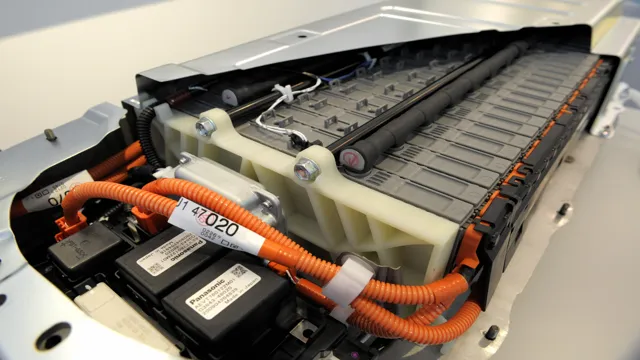Revolutionizing Electric Cars: The Smart Battery Management System You Need to Know About!
Electric cars are becoming increasingly popular due to their eco-friendliness and cost-effectiveness. However, there is one aspect that can make or break an electric car’s success: the battery management system (BMS). Simply put, the BMS is responsible for the performance, longevity, and safety of the electric car’s battery.
It is a crucial component that monitors and regulates the charging and discharging of the battery while ensuring that it remains within safe operating conditions. Without a proper BMS in place, the battery could suffer irreversible damage, leading to reduced performance and even safety hazards. In this blog post, we will delve deeper into the world of battery management systems in electric cars and explore the different aspects that make them so essential.
Let’s take a ride down the electrifying road of BMS!
What is a Battery Management System?
If you own an electric car or are looking to purchase one, you may have heard the term “battery management system” thrown around. But what exactly is it and why is it important? Simply put, a battery management system (BMS) is a crucial component that monitors and controls the performance of the battery pack in an electric vehicle. It ensures that each individual battery cell is functioning properly and prevents overcharging or discharging, which can cause damage to the battery pack.
The BMS also communicates with the vehicle’s onboard computer to provide information such as remaining battery life and charging status. In short, the battery management system used in an electric car acts as the brain of the battery pack, regulating its performance to ensure optimal efficiency and longevity. So, if you want your electric vehicle to perform at its best, a reliable BMS is essential.
Functions of a Battery Management System
A battery management system, or BMS, is a vital part of any battery-powered electrical system. Essentially, a BMS monitors and controls the behavior of a battery to ensure that it operates safely, efficiently, and optimally. This encompasses a wide range of functions, including monitoring vital signs like temperature, voltage, and current flow, and even managing the charging and discharging cycles of the battery.
The BMS is also responsible for detecting any faults or potential issues with the battery, and taking corrective action to prevent damage or failure. A well-designed BMS can significantly extend the life of a battery, and ensure that it operates at peak performance for years to come. Overall, the BMS is the brain of any battery system, and plays a critical role in ensuring reliable, safe, and efficient operation.
So if you’re looking to get the most out of your battery-powered devices, be sure to invest in a high-quality BMS!
Importance of a Battery Management System in Electric Cars
A battery management system (BMS) is a critical component within electric cars that helps ensure the battery operates efficiently and safely. The BMS is responsible for monitoring and regulating the battery’s performance by constantly analyzing the voltage, temperature, and current levels. This information is then used to optimize battery charging and discharging, which maximizes its lifespan and reduces the risk of damage or failure.
In addition, the BMS constantly communicates important data to the car’s computer system, which allows it to calculate accurate estimations of the battery’s remaining charge, range, and time until recharge. Without a reliable BMS, electric car owners could experience a range of problems, from premature battery failure to inaccurate range estimations. Therefore, having a well-designed and properly functioning BMS is essential for ensuring a safe and efficient electric driving experience.
How does a Battery Management System Work?
A battery management system is a crucial component of an electric car, as it helps to regulate and maintain the performance of the vehicle’s battery. Essentially, the system works by constantly monitoring the state of each individual battery cell, as well as the overall health of the battery pack. This includes variables such as temperature, voltage, and current flow.
By collecting and analyzing this data, the battery management system can optimize the charging and discharging process, ensuring that each cell receives an equal amount of charge and minimizing the risk of damage or degradation. In addition, the system can help to prolong the overall lifespan of the battery pack by preventing overcharging and over-discharging, as well as detecting any potential faults or malfunctions. All in all, the battery management system plays a vital role in maintaining the efficiency, safety and longevity of an electric car.
Components and Sensors of a Battery Management System
A Battery Management System (BMS) is an essential component of any battery-operated device, ensuring the safe and efficient use of the battery. The BMS works by monitoring the battery’s critical parameters such as voltage, temperature, and current flow, using various sensors and components. The BMS consists of a microcontroller that collects information from the sensors and controls the battery’s charging and discharging process.
The sensors communicate the battery’s state-of-charge, state-of-health, and state-of-functionality to the BMS, which then decides the optimal charging current, discharge rate, and temperature limits. Some common sensors in a BMS include current sensors, voltage sensors, and temperature sensors. These sensors work together to monitor the battery’s performance and ensure it operates within safe limits.
The BMS also includes protection features such as overcharge protection, over-discharge protection, and over-temperature protection, preventing any damage to the battery. The BMS is critical in maintaining battery performance, maximizing its life, and improving overall user safety. By incorporating a BMS, you can ensure your battery-operated device performs to its full potential while staying safe.
Battery Monitoring and Controls
A Battery Management System (BMS) is an essential component of any rechargeable battery system. It is responsible for monitoring and controlling the charging and discharging of each battery cell to ensure the safe and efficient operation of the entire system. It achieves this by gathering real-time data on various battery parameters such as voltage, temperature, and current, and then using this information to make intelligent decisions about how to manage the battery system.
The BMS also provides essential protection against overcharging, over-discharging, and short-circuiting, which can result in damage to the battery or even pose a safety risk. By using a BMS, the lifespan of the battery can be extended and the overall system reliability can be greatly improved. With the increasing adoption of battery-powered devices in various industries, the development of more sophisticated and intelligent BMSs has become more critical than ever.
Balancing and Temperature Management
A Battery Management System (BMS) plays a crucial role in keeping the battery of an electric vehicle or any other device in optimal condition. One of the main functions of a BMS is balancing the cells in a battery pack. Balancing is important because each cell in a battery has a slightly different capacity and charge level, and if left unmanaged, this can lead to some cells becoming overcharged or undercharged, resulting in a shorter overall lifespan of the battery.
The BMS monitors the voltage of each cell and redistributes the charge as needed, ensuring that all cells are functioning evenly. Another important function of a BMS is temperature management. High temperatures can cause permanent damage to a battery, while low temperatures can reduce its capacity.
The BMS monitors the temperature of the battery and adjusts the charging rate as needed to maintain a safe range. Overall, a well-designed BMS can significantly increase the lifespan and performance of a battery, making it an essential component in modern power systems.
Benefits of a Battery Management System in Electric Cars
A battery management system serves as the brain of an electric vehicle’s battery, enabling it to function optimally and safely. It helps to regulate important parameters such as voltage and temperature, while simultaneously monitoring the battery state, usage, and history. The benefits of a battery management system used in an electric car are that it helps to prevent overcharging, over-discharging, and overheating of the battery, which can ultimately lengthen its lifespan.
Furthermore, it ensures the battery remains within safe operating conditions, which increases the safety of the vehicle and its passengers. Additionally, it helps to conserve energy by indicating the battery’s status to the driver and optimizing the charging and discharging process. All in all, the battery management system in electric cars plays a crucial role in improving the vehicle’s performance, safety, and longevity of the battery.
Prolongs Battery Life and Performance
Electric cars are becoming increasingly popular, but they come with their unique sets of challenges. One of them is managing the battery life, which can influence the car’s performance. This is where a battery management system (BMS) comes into play.
A BMS can help an electric car’s battery operate at optimal capacity and extend its life. By regulating its charge level, the BMS can prevent overcharging and overheating of the battery, which can lead to its deterioration. The BMS can also keep track of the battery’s performance and capacity through various sensors and algorithms, allowing for the car’s optimal performance.
The benefits of a BMS extend beyond the car itself. By prolonging the battery life, the BMS can reduce the waste generated by the battery, making it more eco-friendly. A BMS can also reduce the cost of owning an electric car by increasing its lifespan, which means fewer battery replacements.
In conclusion, a battery management system is a crucial component in electric cars, ensuring their performance, longevity, and sustainability.
Ensures Safety and Reliability
One of the most crucial components of an electric car is the battery management system (BMS). This system not only monitors the battery’s state of charge but also ensures its safety and reliability. A BMS optimizes the car’s performance, controls a variety of parameters, and helps prevent malfunctions or accidents.
Additionally, it prevents the battery from getting overcharged or overheated, which could cause severe damage or even lead to fires. A BMS also provides essential data to the driver, such as the car’s range and estimated time to a full charge. Without a reliable BMS in place, electric cars would not be as safe or practical for everyday use.
So, if you’re considering purchasing an electric car, make sure you invest in one with a proper battery management system.
Future of Battery Management Systems in Electric Cars
When it comes to electric cars, one of the most important components is the battery management system, which helps to keep the battery performing at its best. The system constantly monitors the state of the battery and ensures that it is charged and discharged safely and efficiently. As electric cars become more popular, the future of battery management systems looks bright.
Manufacturers are investing heavily in research and development to create more advanced and sophisticated systems that can optimize battery performance and extend its lifespan. In addition, we can expect to see more integration between the battery management system and other vehicle systems, such as regenerative braking and powertrain control, which will further enhance the efficiency and performance of electric cars. Overall, the battery management system plays a crucial role in the success of electric cars, and we can expect to see continued innovation and advancements in this area in the years to come.
Conclusion
In conclusion, a battery management system is like the brain of an electric car. It ensures that the car’s battery is healthy, charged, and ready to provide the necessary power for the journey ahead. Think of it like this, just as we need our brains to function properly to navigate through life, an electric car needs a battery management system to navigate through the road.
So if you want to keep your electric car’s brain (battery) healthy, make sure you have a reliable battery management system to take care of it!”
FAQs
What is a battery management system in an electric car?
A battery management system is an electronic system that manages and monitors the performance and health of the battery in an electric car.
What are the benefits of using a battery management system in an electric car?
A battery management system can help improve battery life, performance, and safety, prevent overcharging and overheating, and provide real-time monitoring and diagnostics.
How does a battery management system work in an electric car?
A battery management system uses sensors and microprocessors to monitor the voltage, temperature, and state of charge of the battery, and controls the charging and discharging process to protect the battery from damage and ensure optimal performance.
Can a battery management system be upgraded or modified in an electric car?
Yes, a battery management system can be upgraded or modified to improve its functionality and compatibility with newer battery technologies, as well as to provide additional features such as wireless communication and remote control. However, it requires specialized knowledge and expertise to make such modifications.






